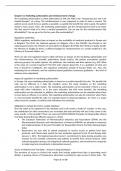Chapter 11: Marketing authorization and reimbursement of drugs
The marketing authorization is often abbreviated as MA; the VHB is the “Vergunning voor het in de
Handel Brengen” of a drug. The reimbursement is very important in order to have a market. The
patient access needs to be as quickly as possible: as quickly the benefit/risk ratio is good, the patient
needs to have access. Then, the marketing authorization and the reimbursement need to be fixed.
We also need to look at in from a societal perspective: Can we pay for the reimbursement (the
affordability)? Can we go on for this for years (the sustainability)?
Regulatory authorities
Which regulatory authorities have an impact on the availability of medicinal products in Europe and
in Belgium? The EMA, the National agencies (in Belgium, this is the FAMHP), the Flemish or the
regional government, the Ministry of social affairs (in Belgium the FOD), the Ministry of public health,
the Ministry of budget (is there a sufficient budget for reimbursement of a certain medicine?), the
Ministry of Economic Affairs, etc..
There are also non-regulatory factors which will have an impact on the marketing authorization and
the reimbursement: the scientific publications (study results), the patient associations (patient
advocacy groups), the public opinion, the politicians, the institutes and their opinion (e.g. KCE: What
is the value of a certain treatment? The KCE write reports about this. It is a guideline of what and
how it should be in Belgium), the regulatory authorities outside of Europe (FDA), etc.. Also, the
marketing has an influence and the authority-based guidelines (consensus guidelines – the level of
evidence to be stipulated).
Impact of regulation on marketing authorization
In Europe, the new marketing authorization is based on a positive benefit/risk ratio. The benefit/risk
ratio can be different in a daily life situation versus the study situation, so the marketing
authorization is not a static matter. The marketing authorization can be extended: If there is a new
study with other indications, or in the same indication but with more benefits, the marketing
authorization can be extended. In addition, the marketing authorization can be extended when there
is more data on efficacy or on safety. The marketing authorization can also be restricted: when there
is a less favorable benefit/risk ratio, for example based on pharmacovigilance. Or, there is a major
safety issue for example, it could be that indications are restricted.
Obligation to include the trial in a public database
The trial needs to be registered in the database and it will receive a Eudra-CT number. In this case,
the statisticians (or other researchers) can re-analyze the data and they will see if they come to the
same results, is this possible? There are some joint EFPIA-PhRMA Principles for Responsible Clinical
Trial Data Sharing Become Effective (January 1, 2014):
The European Federation of Pharmaceutical Industries and Associations (EFPIA) and the
Pharmaceutical Research and Manufacturers of America (PhRMA) are pleased to announce
that implementation of the joint Principles for Responsible Clinical Trial Data Sharing begins
today
Researchers are now able to submit proposals to receive access to patient level data,
protocols, and clinical study reports for new medicines approved in the US and Europe after
January 1, 2014. The biopharmaceutical sector’s commitment to data sharing provides new
avenues for the scientific community and patients to benefit from clinical research, while
maintaining patient privacy, the integrity of national regulators, and incentives for companies
to make long-term investments in biomedical research
Access to Patient-Level Trial Data – A boon to drug developers
The provision of access to clinical trial results that include patient-level data is generating much
debate. A growing chorus of transparency advocates is pushing for open access to these data… The
Pagina 1 van 20




